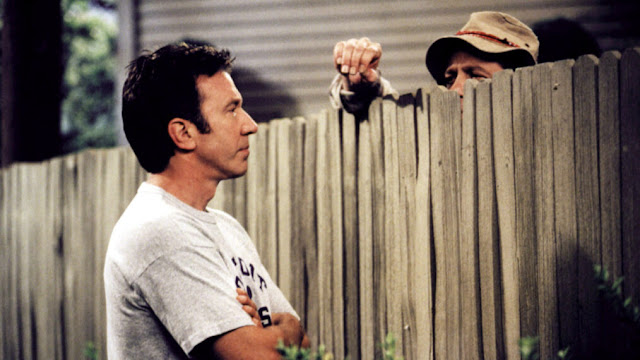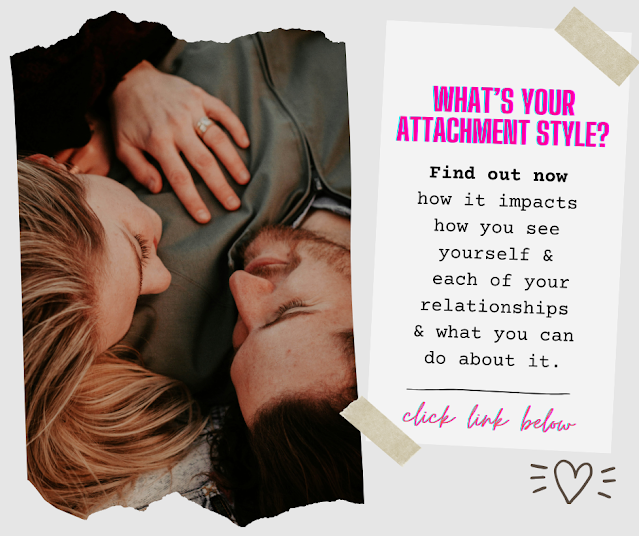What Kind of Fence do you Have?
The famous poet, Robert Frost, once said "Good fences make good neighbors." An example of a good neighbor was Wilson, played by Earl Hindman in the 1990s sitcom "Home Improvement" who was there to offer sound advice to Tim Allen's character. Both characters were able to express their needs and concerns, get close, and yet were able to respect each other's perspectives and space, mostly in part due to having a good fence between their properties.
 |
| Scene from the sitcom "Home Improvement". Courtesy of the Everett Collection |
Boundaries are key in healthy relationships as they create mutual respect by stating what is ok and what is not ok. They let us know where we end and someone else begins. Setting boundaries is a catchphrase we hear often these days, yet doing so carries a lot of misunderstandings and can occasionally be abused. Porous boundaries (i.e. no fence or a broken fence) and rigid boundaries (i.e. a tall, concrete fortress) lead to a variety of relational challenges as well as physical and mental health challenges, so how can we have "good fences" aka healthy boundaries and what do we do if/when others don't respect our boundaries?
Boundary Issues are Common
Nedra Glover Tawwab is a therapist and social worker who has grown in popularity mostly due to her bestselling book "
Set Boundaries, Find Peace: a guide to reclaiming yourself". With almost 10k reviews, and an overall 4.8 rating on Amazon at the time of writing this article, this book and the need to learn about boundaries hits home to many. On her social media pages and in her books she states that whether people know it or not, one of the #1 reasons they are seeking therapeutic services boils down to a boundary issue.
She states in the above-referenced book that anxiety is "often triggered by setting unrealistic expectations, the inability to say no, people-pleasing, and the inability to be assertive." A source of many people's anxiety is a lack of time, to which she states, "We can't create more time, but we can do less, delegate, or ask for help." These quotes make something complicated like anxiety sound overly simplistic and establishing boundaries like doing less, delegating, and asking for help are easily done, but are they?

Almost everyone has boundary issues. Most of us are born into families that have boundary issues that are then passed onto us in the form of beliefs about ourselves and others, and then we create lifestyles around those beliefs. Unhealthy boundaries create unhealthy relationships which in turn create unhealthy people. Anxiety, depression, burnout, eating disorders, high blood pressure, resentment, loneliness, low self-esteem, autoimmune disorders, and much more can be a result of unhealthy boundaries. If you have experienced physical, emotional, or sexual abuse your boundaries were abused in a significant way and you most likely face challenges knowing what are healthy boundaries and how to establish and maintain them.
The 3 Boundary Styles
Below is a helpful table that showcases the 3 boundary styles. With compassion, (aka talk to yourself as you would a beloved friend,) look at the three types below to help you determine which column mostly resembles you.
If you find yourself in the porous or rigid boundaries category rest assured that you are far from alone as both are incredibly common and our choice of boundary stems from things that were once outside of our control. Now that you have newfound awareness you have increased control and choice on what you do moving forward.
For instance, if you are a people-pleaser (i.e. you might feel responsible for other's happiness, and have a hard time noticing your own emotions and needs,) often the
#1 struggle you have is setting boundaries. As a recovering people-pleaser myself, I struggled between having overly porous boundaries. I improperly believed that to be a good Christian required me to behave in many of the ways listed in the porous column. Thankfully as I have studied Christ's life and ministry more closely, I have come to learn that he is the epitome of healthy boundaries which encouraged me to work to establish boundaries in each of my relationships.
“The hardest thing about implementing boundaries is accepting that some people won’t like, understand, or agree with yours. Once you grow beyond pleasing others, setting your standards becomes easier. Not being liked by everyone is a small consequence when you consider the overall reward of healthier relationships.”
― Nedra Glover Tawwab, "Set Boundaries, Find Peace: A Guide to Reclaiming Yourself"
3 Things to Help You Establish Boundaries

- Give yourself the grace that learning any new skill takes time and takes hard work. There are deep-seated reasons why you do what you do. Change is hard, even if it is towards greater health. Facing new self-awareness has many rewards but it comes with many challenges. The payoffs are worth it, but compassion is necessary, and if you find yourself struggling with new personal discoveries, reach out to a trusted friend or a mental health professional.
- Boundaries are established to improve your relationship with others AND yourself. Below are a few examples of boundaries that Nedra Glover Tawwab has established for herself that you maybe did not realize are boundaries in the first place.
“I say no to things I don’t like. I say no to things that don’t contribute to my growth. I say no to things that rob me of valuable time. I spend time around healthy people. I reduce my interactions with people who drain my energy. I protect my energy against people who threaten my sanity. I practice positive self-talk. I allow myself to feel and not judge my feelings. I forgive myself when I make a mistake. I actively cultivate the best version of myself. I turn off my phone when appropriate. I sleep when I’m tired. I mind my business. I make tough decisions because they’re healthy for me. I create space for activities that bring me joy. I say yes to activities that interest me despite my anxiety about trying them. I experience things alone instead of waiting for the “right” people to join me.” ― Nedra Glover Tawwab, "Set Boundaries, Find Peace: A Guide to Reclaiming Yourself"
- Boundaries are a sign of love as they create sustainable ways to maintain a relationship. You putting up a fence is a way of saying, "I want you in my life and this is how we can keep a relationship that fosters respect and appreciation for one another." We need to know where we end and the other person begins as boundaries foster healthy autonomy, interdependence, and differentiation, keys to healthy people and relationships. Nedra Tawwab said, "We don't naturally fall into perfect relationship; we create them." Our families and our relationships are systems that operate under many spoken and unspoken rules. When we change ourselves the system is forced to adapt and change. Establishing boundaries is not forcing anyone to change per se, but it can require them to change if/when they want to interact with you. If you would like help doing this with family members, here is a helpful resource I sometimes provide my clients:
Boundaries are Complicated
To adequately cover the topic of boundaries in a blog post is impossible. Boundaries for yourself, with a best friend, with a co-worker, with a parent, partner, etc. all vary. Nevertheless, if you find that you are harboring feelings of resentment or bitterness in a relationship, know that a boundary has been crossed or improperly established. If you notice that getting texts, phone calls, or visits from a family member or friend causes you anxiety, to become passive-aggressive, or to feel triggered, boundaries need to be established or edited.
There are countless ways to politely and assertively state your boundary to all of the above groups of people, and if you are looking for more specific suggestions "Google" or search via Pinterest "Boundaries might sound like..." (also, "Setting boundaries with a ______ (fill in the blank) might sound like".
 |
Courtesy of TheMindsJournal.com |
Should I Cut Off my Family Member Completely?
Boundaries are established to keep and improve a relationship, not to cut someone out. If you find that you are dealing with someone who abuses you and/or disrespects you and your boundaries then the question is "Should I cut this person out of my life?" This is a much easier decision when it comes to a boss, friend, or other non-family relationship as you can seek a different position or job, change your social network, and much more. None of these decisions are easy, but they are doable and sometimes advisable. However, when it comes to our blood relatives, this is a much more serious decision.
As a therapist I find myself cringing at the overuse of the word "narcissist" and people cutting family members off completely. Yes, there are narcissists out there, and yes some family members do not deserve a relationship with you based on their past or current actions/behavior, but these labels and actions need to be well-informed and well-thought-out, not based off of an Instagram post, a TV show, or a well-meaning friend. I have seen the negative consequences that can come from doing these things rashly or out of a place of high emotions with emotionally charged words that felt true in the moment.
All relationships are complex and challenging, even the healthy good ones. Healthy people make mistakes and are selfish at times. Healthy individuals have challenges with healthy communication and honoring others' needs at times, especially in times of high stress or emotion. But unfortunately, many unhealthy people do not choose to get to a healthier place. These individuals can be abusive, toxic, and/or emotionally immature adults who have not respected your boundaries and will refuse to honor them as you establish them. The key is knowing if they should be cut out of your life or if you need firm and defined boundaries.
There is nothing I can simply write in this post that will tell you whether you should cut someone out of your life completely or not. Making an important decision like this requires listening to what your gut tells you and talking to trusted close others who know you and your situation well (including a therapist). Tuning into the Divine is another important aspect that should be included in a decision like this, however, that looks in your belief system. What is important to consider is that this can be a decision that you make that has parameters around it, such as "Until ________ can _______, I will not _________."
You Deserve Healthy Relationships
Healthy relationships take commitment and work, but they are worth it. If you have not experienced many healthy relationships this transition will be extra challenging. What is ironic about healing is that if you are used to unhealthy relationships they can feel more safe and comfortable. As you start to create healthier relationships or find healthier people, you might find that you feel undeserving, want to run away, or want to sabotage the peace so that it feels like the chaos we are used to. If you find that you relate to any of the above, rest assured that this is a psychologically normal response, and working with a mental health professional will help you work through trauma and unhealthy relational patterns.
Establishing and maintaining healthy boundaries is just one fundamental way toward healthy relationships. Our relationships are key to our happiness and peace so boundaries are an essential component to us gaining happiness and peace, and you deserve both.










.jpg)
